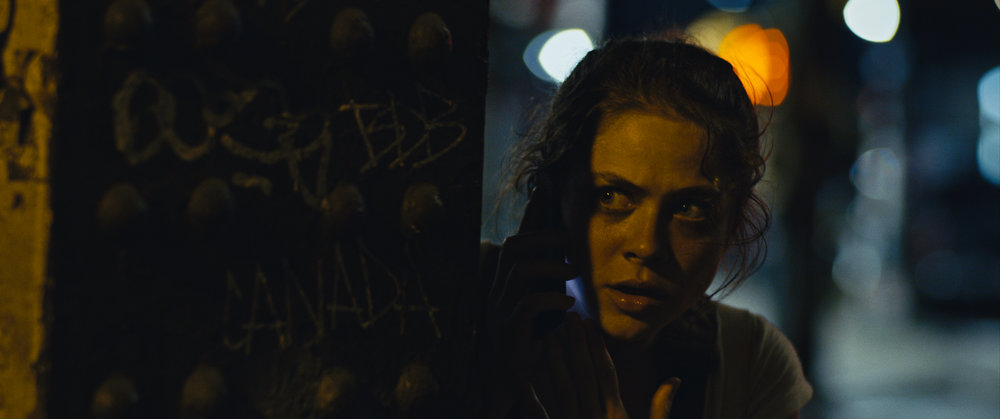
by Ross Trivisonno
In this modern age of anxiety that we perpetually, and miraculously, trudge through on a daily basis, everything is the bother: bills to pay, mouths to feed, commitments to fulfill, relatives to please, societal injustices to vanquish, and, yes, Russians to cower from. Oh, the Russians: the ever-elusive bogeymen that us zealous Americans salivate over both fearing and hating. Well, that’s at least one of many inherent themes nested in Dan Erickson’s unassuming 2019 indie flick, Treasure Trouble, a film that truly runs the gamut in exploring a number of socio-cultural tropes popular in present-day society, while still remaining tethered to a cogent and compelling narrative.
Clocking in at a comfy 125 minutes, Erickson’s thrilling comedy commences with the female lead, Eve (Olivia Luccardi) – a scavenging, metal-detector-touting treasure hunter on what is presumably Coney Island – finding an encased gun on the beach adjacent to the shanty oceanfront abode she shares with newly moved-in roommate and underground (most likely contraband) radio talk show host, Ernie. Shock and then panic quickly ensue as one miscommunication after another leads Eve to believe that the pistol belongs to the Russian mafia, whom she’s almost certain are nipping at her heels. Several missing dogs and an ex-boyfriend reunion later, we are introduced to the full motley crew of a cast that made this light-heartedly scripted, yet thoughtfully themed, film such a compelling entry in the 2019 Austin Film Festival (AFF).
The autumn festival is an eight-day affair that, albeit Natalie Portman-less this time around, frequently brings some of the film industry’s best and brightest to a city more known to outsiders for its bustling live music scene and chic, Portlandia-like hipster subculture than for its sizable contributions to the big screen. And, boy, was the Paramount Theatre’s big screen ablaze with an expansive, remarkably complete lineup of marquee headliners, short films, low-budget indies, and amateur productions alike this fall, all of which enhanced Treasure Trouble’s uniqueness even more.
Few times have I ever witnessed a film so perfectly encapsulate everything from Cold War-esque Trump-Russia hysteria to the idiosyncrasies of modern feminism and the much-debated role of guns in America. And yet, Treasure Trouble’s novelty is compounded even more by the fact that it is clearly a small-time, small-scale work. Pervasive and consistent over the course of the winding, spell-binding film is Ernie’s counter-establishment radio broadcast, which plays softly (but sometimes loudly) in the background as he espouses culturally au courant leftist views that would make the eyes of any populist American in the vein of Bernie Sanders light right up. One moment he’s talking about police brutality and another he’s making implied references to the Mueller Report before segueing into the evils of the Washington think tank elites. It’s this whole smorgasbord of commentary on current event topics – which Erickson so carefully, meticulously layers over Treasure Trouble’s actual plot – that allows us to hear many of the film’s primary themes on the AM before we actually see their narrative equivalencies on screen.
This formal reading of such thematic/cinematographic pairings is truly an exercise in hawk-eyed diligence on the part of the viewer just as much as the director. Blink, and you’ll miss one of the many rapid-fire choke shots that Erickson employs to signal Eve’s supposedly impending doom. Blink again, and some of the more inorganic shots of a tilted Manhattan skyline (as imbued with chaos and confusion as is nearly every principal character) will be for not. While for some films, the devil may lie in the details of their formal elements – their incoherent canted shots, an inconsistent mise-en-scene, or the (over)use of certain emphatic patterns to a dizzying extent – many of Treasure Trouble’s most dazzling qualities are in this very arena. And it’s an arena rich with cinematography that is as scrupulous of its formal ingredients as it is (ironically) irreverent of the recipe most filmmakers submit to in their attempts at producing an all-too-often only half-baked picture. But, no, not here! This, on the rare hand, appears to be a picture so aware of its place in time, so conscious of its epoch, of the zeitgeist it so brilliantly attempts to communicate, that its formally-weighty thematic metanarrative almost feels like a standalone narrative in and of itself.
And, yet, I’d be remiss if I didn’t mention the big surprise (or unsurprise, depending on how intuitive one may be), the spoiler to end all spoilers: it wasn’t the Russians. Eve and her ragtag band of ex-boyfriends, ex-boyfriend fiancés, decades-older radical roommate shock jocks, beach-scavenging co-workers, and dog-napper victims galore finally come to the conclusion that everything was, after all, just one big misunderstanding, sparked by misinformation and compounded by mistrust and unlucky mishaps. But somehow, in this brave, brave new world of perpetual post-truths, fake news, and institutional skepticism that we live in, what may make no sense to Treasure Trouble’s principal characters actually makes perfect sense to viewers: that we, in this country, have reached a point of such confusion and anxiety over, well, frankly everything, that it has become exceedingly easy to sow societal pandemonium about, well, anything.
Perhaps the Russians, the prototypical villains to end all villains in the American imagination, may be complicit, or perhaps they may not; however, one thing is true. That is, reality no longer matters, but rather perception does, and if foreign actors can plant just enough seeds of doubt in the minds of a society, the truth of the crime matters not, while the ensuing confusion and distrust matters the world. And so, this is what Treasure Trouble so masterfully showcases: just how easily much ado about nothing can become much ado about everything, regardless of the facts of the matter — now more than ever before.
Clearly the mood of our country (and the mood of our world, for that matter) is unwell. But AFF’s adventure through the zeitgeist isn’t limited to Treasure Trouble. In Waves – a tumultuous, graphically saturated, empaths’ rollercoaster of a movie that delves into the complex topics of suburbanism, excess, and race’s relation to the two – we’re taught that too much love, too much ambition, too much control, too much of anything good in life can, and almost certainly will, become a bad thing.

Described by director Trey Edward Shults during the festival screening’s Q&A session as a “film about black people who have white people problems,” Waves certainly does make waves: it frequently utilizes a unique, 360-degree, revolving camera to not only dazzle cinematographers left and right, but to symbolize the circularity of the characters’ narrative arcs, and life at large. Its effusive, emotional turbulence is paired seamlessly with the themes of another clear-favorite from the festival, Just Mercy – Destin Daniel Cretton’s latest tear-jerking, historical legal drama that stars Michael B. Jordan in an undoubtedly award-worthy portrayal of the Montgomery-based Equal Justice Initiative’s founder and defender of wrongly-convicted death row inmates, Bryan Stevenson.
And while Just Mercy may showcase far less cinematographic audacity – its formal elements somewhat unimpressively flirt with traditional drabness – thematically-speaking, both of these films grapple with what it means to be black in America (upper-middle class black in Waves versus impoverished black in Just Mercy), an eternal topic that has only been amplified even more in recent times by the seemingly endless headlines of police brutality, criminal (in)justice, and gentrification, all against people of color. Shults and Cretton’s films each speak to the class-based themes that the other lacks, forming a complementary tandem replete with social criticism, while the aforementioned trio – the misconstrued, comedic premise of Treasure Trouble, the Southern courtroom setting of Just Mercy, and the family-centric nature of Waves – almost lends itself, in aggregate, to something in the tradition of My Cousin Vinny.
So in a country starting to again feel the generationally-recurring growing pains of foreign-manufactured outrage, and racial and class division, this year’s 26th iteration of the Austin Film Festival was a masterclass in capturing it all: the good, the bad, and the ugliness of society’s challenges at present. And it did it with ingenious screenwriting – always an obvious staple of AFF – and eye-popping camera work, all the while flexing its trailblazer muscles by providing us with a remarkable canon of genre films to discuss and fawn over ad nauseum. Welcome to the top, AFF, because this festival seems to out-do itself year after year, several of which I’ve been fortunate enough to witness firsthand. This past October was certainly no exception.